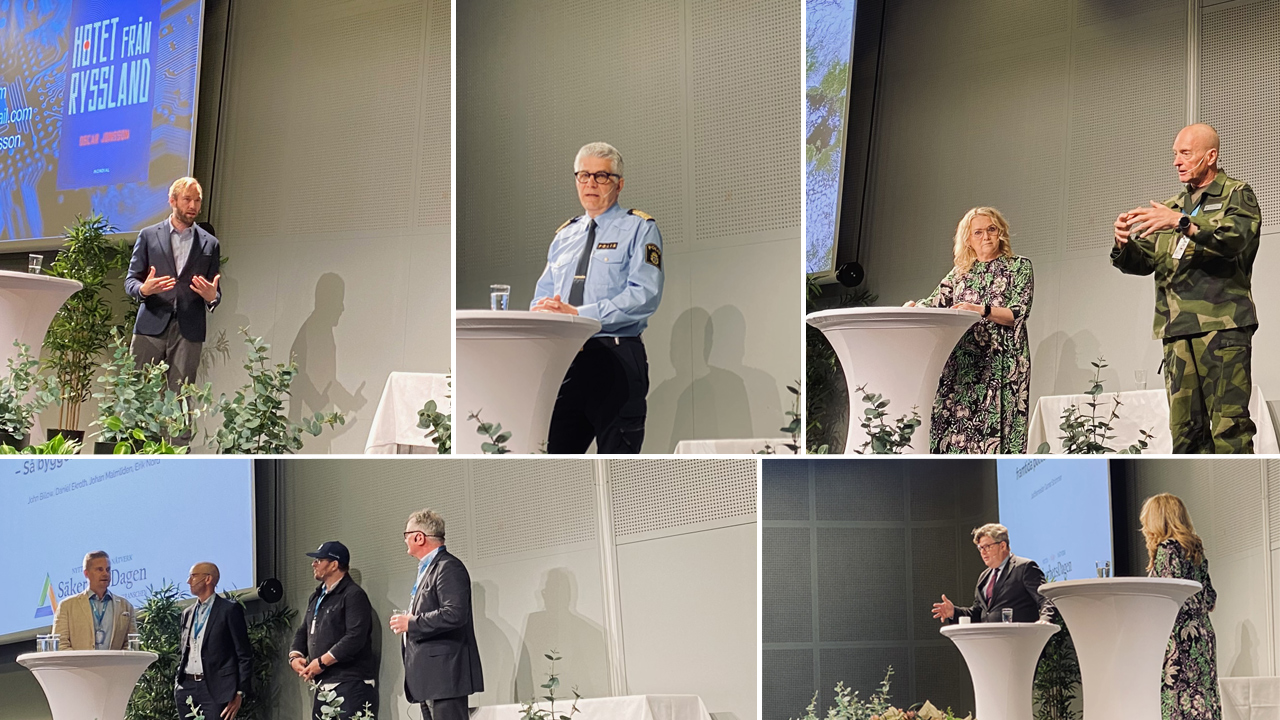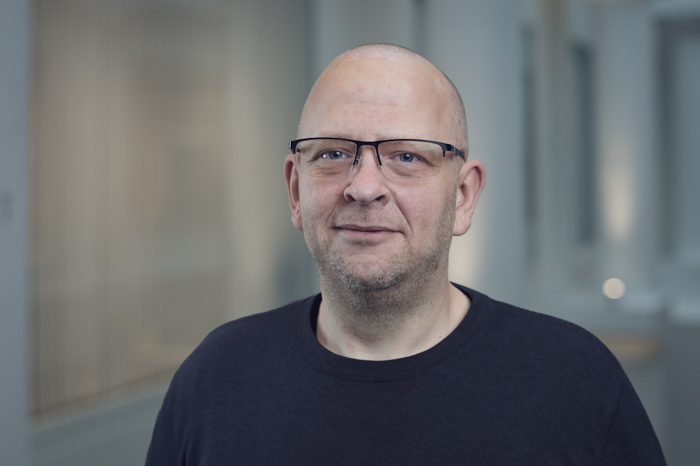
Speakers on SäkerhetsDagen 2023. Foto: Lisa Heino
The gloomy state of the world and expanding gang-related crimes in Sweden were themes addressed by many of the speakers who also covered topics such as cyber threats, total defence and the importance of identity and background checks when recruiting. Below, we provide a summary of the events and some of the most important takeaways from the speakers at SäkerhetsDagen.
Oscar Johansson, PhD in War Studies and researcher at the Swedish Defence Ministry, started things off by talking about his book, “The Threat from Russia” and what is nearly an existential fight in which Russia finds itself in relation to the West. He explained how the threat from Russia is heavy in intelligence terms with plenty of KGB types occupying top posts in the country, that it is long-term given the fact that the enemy narrative is being cemented by propaganda, and that Russia is compensating for the fact that, relative to the West, it is weaker in pure military terms by making noise about nuclear weapons. He concluded with a sliver of optimism that the Russian threat is not unsurmountable if we take action and acknowledge both that our needs are great and that there is much to be done.
The first panel debate of the day addressed cyber security in a digital world and was opened by Johan Malmliden, Group CEO of Omegapoint, who emphasised the importance, among other things, of ensuring that quality and security are part and parcel of every system from top to bottom. Industrial technology is becoming all the more interlinked but remains relatively unsecure from a cyber security perspective. Johan also took up the issue of the global conflict between the free West and autocratic countries such as Russia, China, Iran, etc., as well as the importance of the West “winning” more deals in developing countries so as to ensure that they are not completely overrun by autocratic powers.
Additional takeaways from the panel debate were provided by John Billow of the Swedish Defence Materiel Administration who drew attention to the fact that globalisation and digitalisation links us globally and play a role in geopolitics. He also acknowledged the ever-increasing specialization of IT criminals operating through crime syndicates under the guise of large companies and with a disregard for international borders.
In addition, there was a discussion regarding the stigma associated with talking about failed IT systems and how, in Sweden, a technically developed country, we are regrettably naive when it comes to IT security. We must understand that cyber security is about how we behave on the digital front one hundred per cent of the time, in all contexts and, in so doing, rendering it a perpetually present issue which cannot be separated our professional and private lives.
On the issue of the way companies can improve their IT security, the panel offered the following:
- IT and cyber security must be part of the business. This will sometimes render business operations inflexible and unwieldy, but it has to be this way in order to ensure that the hits are taken “in the right place”.
- Do not focus on price during the initial phases of procurement; look at it as a long-term investment.
- Bring in an expert to perform an analysis of your situation and needs before procurement gets underway.
- Train your personnel and establish sound operations with loyal employees.
Following the lunch break, it was time for National Police Commissioner Anders Thornberg to share his thoughts. He began by emphasising the importance of having access to relevant information in digital channels and the role of police work. Commissioner Thornberg said that this was an issue relentlessly pursued by Sweden during its chairmanship of the EU Council of Ministers in 2023.
He further talked about how a new evidence-gathering procedure, “remote searches”, makes it possible for the police to obtain information stored abroad, which will play a significant role in the future of crime prevention, as well as the fact that cybercrime has had the opportunity to grow rapidly because IT security cannot keep up with IT developments in society. He also made reference to the importance of the cooperation between public authorities and private actors in achieving good results.
Furthermore, Commissioner Thornberg described the increased abilities security guards will have. By virtue of police training and access to the it-system Nova for reporting and, eventually, Rakel – the Swedish national digital communications system used by the emergency services – security guards will be able to relieve police in certain parts of their operations.
He also raised the importance of preventative work. Currently, roughly three people join the world of crime daily – young people from various parts of Sweden, with no criminal record, and who are not already police scrutiny. This is a trend that must be broken, preferably at the earliest stage possible. Secrecy continues to be a major problem which prevents public authorities from sharing information amongst themselves and which renders preventative work more difficult.
When it was the audience’s turn to ask questions, the first question was whether additional police would be a solution, to which the answer was affirmative. The police require more people and will be able to do a better job. Commissioner Thornberg wants to see Sweden reach the EU average and have additional community policy offers and intervention officers who can work preventatively. He also underscored the importance of working faster and smarter.
In response to the question whether there were sufficient resources to combat cybercrime, the answer was in the negative. There are insufficient resources to respond to the speed at which the crimes take place.
Michael Malm from the Swedish Armed Forces began his presentation by describing the current situation in the world at large and the security policy environment, a setting in which Russia is prepared to take enormous risks, both economically and humanitarian as well as politically in order to achieve its goals.
He explained that the war in Ukraine gives us an idea of what a modern war might look like – with AI applications and drones woven together with old materials, paramilitary groups (27 groups of which the Wagner Group is the most widely known), psychological warfare, trade warfare, cyber warfare and cultural warfare involving an attempt to eliminate Ukraine’s cultural heritage and erase its history. This type of warfare is not new as it also happened during the wars in Syria and Chechnya.
Michael was clear that, based on the above, the Armed Forces have excluded nothing. This also means that there is a risk of nuclear involvement. There must be plans for an unrestricted war and the fact that the situation can change very rapidly.
But what does this mean for us?
Michael explained that Sweden, by virtue of being part of the Western collective, is a part of the enemy and a potential target in the Russian view of things. Manufacturing, storage and transportation are parts of society which may be attacked by Russia.
He then addressed the role of total defence. The whole of society will and must be engaged in this issue. Sweden has 456 public authorities and 1.3 million companies which a substantial and significant part of the total defence. In addition, there are approximately 400,000 associations of various types in which vigorous club activities have contributed to a good capacity to organise when things go wrong.
However, it is not only public authorities, companies and organisations which are subject to the total defence obligation. All citizens and residents of Sweden between the ages of 16 and 70 are duty-bound to participate in total defence, which means that everyone, where necessary, must participate in preparing Sweden for war.
Michael raised the point that Sweden has a very good platform on which to stand and work from, but we need to focus more on the ability to recover and the supply of electricity. He also emphasised the fact that societal awareness is in short supply and there are too few persons, particularly at the governmental level, who know how the Sweden operates on a local, regional and national level.
The day’s second panel debate on the theme of the “Internal threats – how do you know who you are really employing?” addressed the importance of identity and background checks when recruiting. The panel participants discussed the importance of carrying out identity checks at a physical meeting where ID documents can be reviewed carefully. There was also a discussion about how AI has made it easy to forge ID documents, as a consequence of which extra checks should be carried out by comparing ID cards against original documents issued by the responsible public authority.
The panel also emphasised the importance of companies not being bashful about conducting background checks when recruiting but, rather, should treat them as a seal of quality for which reflects on the company. They should be viewed as acts that show that you work preventatively and take security seriously.
During the third panel debate with the theme, “The security industry – an industry of the future”, the focus was primarily on the lack of expertise in an industry which took off during the pandemic and continues to grow today. Attention was drawn to the problem of eagerly recruiting from an organisation’s own ranks, which drives salaries to a peak and forces the organization to reconsider. This forces companies to open up for new ways of thinking when recruiting and to also focus on incorporating training within the organisation. In order to cover a shortage of competence, it will be critical to be a teaching organisation with an “A-team” and a “B-team” in which personnel are constantly learning. Since schools cannot be relied upon to keep up with technical developments, training must take place at the company level where the technology exists.
There was also talk about the fact that studies show that young people today readily work for a higher purpose and hope to make a difference for both persons who lead regular lives and persons who are facing difficulties, as well as their own country. In this regard, the security industry has an advantage in being able to offer jobseekers precisely that – work in which one can actually make a difference.
Minister of Justice Gunnar Strömmer was invited to discuss how the industry will be impacted by future political efforts. He began by discussing social developments in which shootings and bombings make Sweden conspicuous in an exceptional way when viewed from a Nordic perspective. The type of crime we have today, in which perpetrators show no restraint and are indifferent to the consequences violence has on bystanders, is a challenge for the entire system.
Gunnar Strömmer emphasized the fact that the police are looking for the opportunity to use eavesdropping as a preventative measure, discussed the problems created by secrecy legislation in working preventatively, and addressed the importance of surveillance cameras to be able to solve crimes. He also talked about the culture of silence which needs to be dismantled since it is a threat to the values of the rule of law.
Like Anders Thornberg, Gunnar Strömmer also made mention of security guards as an asset looking forward.
In response to the question of his views on private prisons, he says that it is not a relevant issue for the moment, but he is also open to the notion in the future.
On 18 August 2021, Gävle suffered a 1,000-year rainstorm which presented an enormous challenge. The last speaker of the day was Cathrine Holgersson, Managing Director of Gavlegårdarna which is Sweden’s largest public property company which holds approximately 60% of all rental apartments in Gävle municipality.
Cathrine described in colourful terms how the extreme rainfall impacted 8,000 households and 14,500 tenants, how crisis management unfolded, and the unreasonable pressure exerted by the media. She also described how a fire impacted one of Galvegårdarna’s rental buildings approximately 6 weeks after the rain.
Her most important takeaways regarding crisis management were that:
- Get help from experts, there is always somebody out there who knows more.
- Take charge of communications. In the case of Gavlegårdarna, this entailed weekly press conferences.
- Be realistic – not kind.
- SMS communications are a good way to quickly disseminate information. The telephone is often easy to access and close by.
- When the emergency is over, examine management, agreements, etc., and get the work of improving procedures underway.
SäkerhetsDagen 2023 was concluded with a mingle and banquet.


